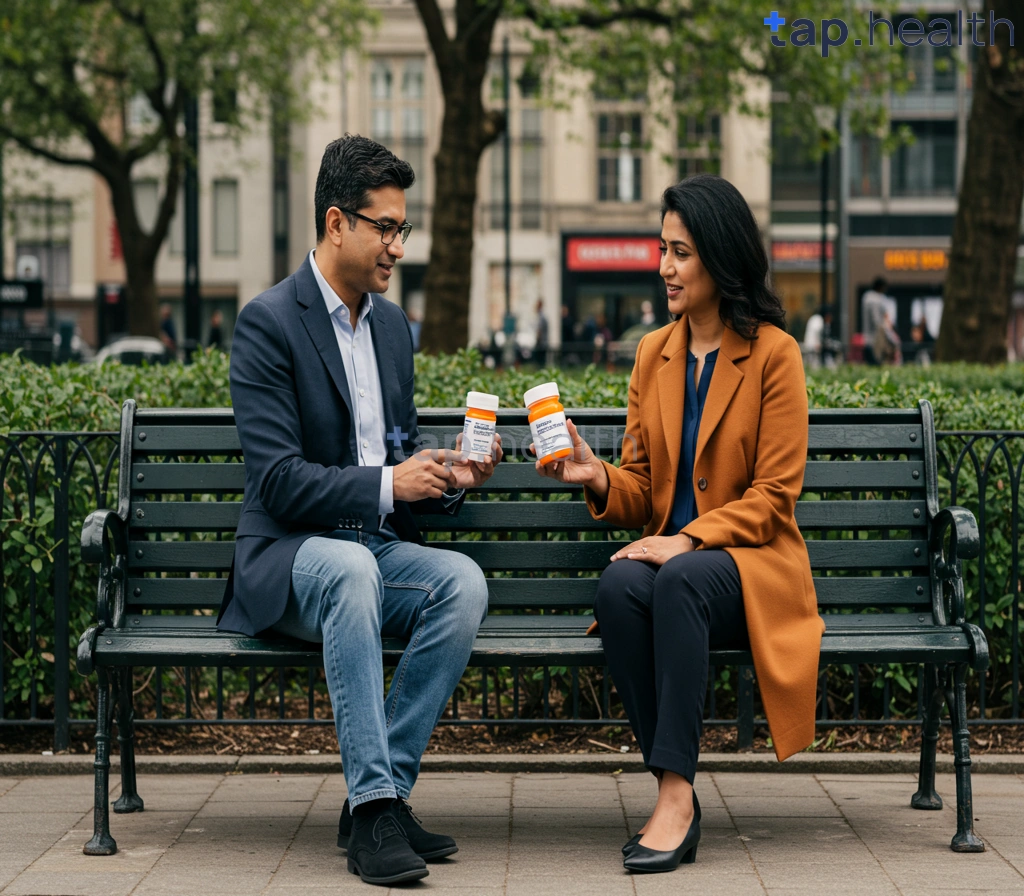Table of Contents
- Dapagliflozin and Metformin: A Complete Guide
- Understanding Dapagliflozin/Metformin: Benefits & Risks
- How Effective is Dapagliflozin with Metformin?
- Dapagliflozin and Metformin Dosage: A Comprehensive Guide
- Is Dapagliflozin/Metformin Right for You?
- Frequently Asked Questions
- References
Managing type 2 diabetes can feel like navigating a complex maze, but understanding your treatment options is key to taking control. This comprehensive guide focuses on a common and effective medication combination: Dapagliflozin and Metformin (Oral). We’ll explore how this powerful duo works to lower blood sugar levels, delve into potential side effects, and help you understand if it’s the right choice for you. Whether you’ve just been diagnosed or are looking to optimize your current treatment plan, this detailed resource will provide the clarity you need. Let’s unlock the potential of Dapagliflozin and Metformin together!
Dapagliflozin and Metformin: A Complete Guide
The global fight against diabetes is significantly impacted by the fact that over 75% of people living with this condition reside in low- and middle-income countries, as highlighted by the International Diabetes Federation. This statistic underscores the critical need for accessible and effective diabetes management strategies, particularly in regions like India and other tropical countries. Understanding medications like the combination of dapagliflozin and metformin is crucial in this context.
Understanding Dapagliflozin and Metformin
Dapagliflozin and metformin are commonly prescribed together to manage type 2 diabetes. Metformin, a first-line treatment, works by improving the body’s sensitivity to insulin and reducing glucose production in the liver. Dapagliflozin, a sodium-glucose co-transporter 2 (SGLT2) inhibitor, works differently by helping the kidneys excrete excess glucose in the urine. This combined action offers a powerful approach to blood sugar control. The synergistic effect of these two medications often leads to better glycemic control than either drug alone.
Benefits and Considerations in Tropical Climates
This combination therapy offers several advantages. It can effectively lower blood sugar levels, reduce the risk of cardiovascular complications, and contribute to weight management. However, it’s crucial to remember that individual responses to medication can vary. In tropical climates, factors such as dehydration and potential dietary differences should be considered when managing diabetes with this combination. Regular monitoring of blood sugar levels and close consultation with healthcare professionals are essential for optimal management. It’s important to understand how other medications might interact; for example, you might want to read more about how Lexapro affects diabetic medicine if you’re taking both.
Actionable Steps for Better Diabetes Management
For individuals in India and other tropical countries, maintaining a healthy lifestyle is paramount alongside medication. This includes a balanced diet rich in fruits, vegetables, and whole grains, regular physical activity, and consistent medication adherence. Consult with your doctor or a qualified healthcare professional to determine if dapagliflozin and metformin are the right treatment option for you and to discuss potential side effects and management strategies specific to your region and health status. Early intervention and consistent management are key to preventing long-term complications associated with diabetes. Remember to always check with your doctor before taking any over-the-counter medication, such as Robitussin, to ensure it won’t negatively interact with your diabetes treatment.
Understanding Dapagliflozin/Metformin: Benefits & Risks
Diabetes is a significant global health concern, costing the U.S. an estimated $327 billion annually in direct medical costs and lost productivity. This staggering figure highlights the urgent need for effective and accessible diabetes management, particularly in resource-constrained regions of India and other tropical countries. Dapagliflozin/metformin combination therapy offers a potential solution for many individuals.
Benefits of Dapagliflozin/Metformin
This combination medication leverages the strengths of two distinct mechanisms. Metformin, a cornerstone of type 2 diabetes treatment, improves insulin sensitivity and reduces glucose production by the liver. Dapagliflozin, a SGLT2 inhibitor, works by increasing glucose excretion through the kidneys, lowering blood sugar levels independently of insulin. This dual action often leads to superior glycemic control compared to either drug alone. This is particularly beneficial in managing the high prevalence of type 2 diabetes in India and other tropical regions where access to specialized care can be limited. The combination can simplify medication regimens, improving adherence for patients. Managing diet is also crucial; for example, you might consider learning more about whether Is Dalia Good for Diabetes.
Potential Risks and Considerations
While effective, Dapagliflozin/metformin is not without potential side effects. Common side effects include nausea, diarrhea, and vomiting, which are often manageable. More serious, though rare, side effects can include urinary tract infections, ketoacidosis, and dehydration. Regular monitoring of blood glucose and kidney function is crucial, especially in individuals with pre-existing kidney disease. Given the high prevalence of specific comorbidities in tropical regions, careful assessment of individual patient profiles is essential before prescribing this combination therapy. It’s important to consult with your doctor to determine if this treatment is right for you and to discuss any potential risks or side effects. In addition to medication, exploring safe and effective dietary supplements for diabetes care can be beneficial but should always be done in consultation with a doctor.
Next Steps for Indian and Tropical Region Patients
Individuals with type 2 diabetes in India and other tropical countries should discuss their options with their healthcare providers. Understanding the benefits and risks of Dapagliflozin/metformin, alongside other treatment options, is crucial for making informed decisions about diabetes management and improving long-term health outcomes. Remember, early diagnosis and proactive management are key to mitigating the burden of this chronic condition.
How Effective is Dapagliflozin with Metformin?
Maintaining healthy blood sugar levels is crucial, especially in regions like India and other tropical countries where diabetes prevalence is high. A normal fasting blood sugar level is between 70–99 mg/dL. Prediabetes, ranging from 100–125 mg/dL, signals an increased risk, while levels of 126 mg/dL or higher indicate diabetes. Many individuals with type 2 diabetes find effective blood sugar management through a combination of medications. Dapagliflozin and metformin, often used together, offer a powerful approach.
Understanding the Synergy
Metformin, a first-line treatment, works primarily by improving insulin sensitivity and reducing glucose production in the liver. Dapagliflozin, a SGLT2 inhibitor, works differently; it helps the kidneys excrete excess glucose in the urine, thus lowering blood sugar levels. Combining these medications creates a synergistic effect, meaning their combined impact is greater than the sum of their individual effects. This approach often leads to better glycemic control than using either drug alone.
Improved Outcomes in Diverse Populations
Studies have shown that the combination of dapagliflozin and metformin is effective in diverse populations, including those in tropical climates. This is important because factors like diet and lifestyle in these regions can influence blood sugar control. However, individual responses can vary, and regular monitoring is essential. Always consult with your doctor to determine the best treatment plan for your specific needs and health conditions. For information on other medications, you might find our article on Is Glucocil Safe for Type 2 Diabetes? helpful, although it focuses on a different medication.
Seeking Expert Advice in India and Tropical Regions
It’s vital to discuss your blood sugar levels and potential medication options with a qualified healthcare professional. They can assess your individual risk factors and recommend the most appropriate treatment strategy, considering your lifestyle, dietary habits, and overall health. Don’t hesitate to seek expert advice; proactive management is key to preventing serious complications associated with high blood sugar in India and other tropical countries. While this article focuses on blood sugar, managing other health conditions is also important. For example, you might be interested in learning more about Does Methylfolate Help Prevent Alzheimer’s Disease?.
Dapagliflozin and Metformin Dosage: A Comprehensive Guide
Maintaining healthy blood sugar levels is crucial, especially in tropical climates where dietary habits and lifestyle factors can significantly impact diabetes management. The recommended target for pre-meal blood sugar is between 80–130 mg/dL, and post-meal levels should ideally be less than 180 mg/dL. Achieving these goals often involves a combination of medication and lifestyle changes. Dapagliflozin and metformin, frequently prescribed together, play a key role in this process.
Understanding the Dosage Regimen
The specific dosage of dapagliflozin and metformin will be determined by your doctor based on your individual needs, overall health, and response to treatment. It’s crucial to follow your doctor’s instructions precisely and not adjust your medication without consulting them. Factors such as age, kidney function, and other existing health conditions influence the appropriate dosage. In India and other tropical countries, where variations in diet and activity levels are common, personalized dosage adjustments may be particularly important. For a better understanding of insulin dosages, you might find our article on What Is The Average Dose Of Insulin For Type 2 Diabetes? helpful.
Tips for Effective Management
Remember that medication is just one part of effective diabetes management. Maintaining a healthy diet, incorporating regular physical activity, and managing stress are equally important. In many tropical regions, access to fresh fruits, vegetables, and whole grains is readily available, providing opportunities for dietary improvements. Consulting a registered dietitian familiar with the nutritional needs of people with diabetes in your region can provide tailored dietary guidance. Regular monitoring of your blood sugar levels, as recommended by your doctor, is also vital for tracking progress and making adjustments to your treatment plan as needed. Understanding what constitutes a normal blood sugar level is important. You can learn more by reading our guide on Is a 100 mg/dL Blood Sugar Level Normal?
Consult Your Healthcare Provider
It is essential to consult your doctor or a qualified healthcare professional before starting or changing any diabetes medication. They can help you determine the appropriate dosage of dapagliflozin and metformin based on your specific circumstances and provide personalized guidance on managing your diabetes effectively. Early and proactive management is key to preventing long-term complications.
Is Dapagliflozin/Metformin Right for You?
Managing type 2 diabetes effectively is crucial, especially in regions like India and other tropical countries where dietary habits and lifestyle factors can significantly impact blood sugar control. A common approach involves medication, and the combination of dapagliflozin and metformin is frequently prescribed. But is this the right treatment for *you*?
Understanding Dapagliflozin/Metformin
This combination therapy leverages the strengths of two different diabetes medications. Metformin helps your body use insulin more effectively and reduces glucose production by the liver. Dapagliflozin, a SGLT2 inhibitor, works by helping your kidneys remove excess sugar from your blood, lowering blood glucose levels. This dual action can be highly effective in managing blood sugar, particularly when lifestyle modifications alone aren’t sufficient.
Considering Your Individual Needs
Determining if dapagliflozin/metformin is suitable requires a consultation with your doctor. They will consider your overall health, current blood sugar levels, other medications you are taking, and your lifestyle. Dietary considerations are also key. For effective blood sugar management, many doctors recommend aiming for roughly 45–60 grams of carbs per meal, but this is a guideline and your individual needs may differ. To learn more about different dietary approaches, you might find our article on Low-Carb vs. Moderate-Carb Diets for Diabetes: What Works Best? helpful. Your doctor can help you create a personalized meal plan that works for you.
Next Steps for Indian & Tropical Patients
Living in a tropical climate often presents unique challenges in managing diabetes, including increased thirst and dehydration. Open communication with your doctor is vital. Discuss your lifestyle, dietary habits, and any specific concerns you have about managing your diabetes effectively within the context of your environment. If you have kidney disease, consider reading our article on Which Diabetes Drug is Best for Diabetics with Kidney Disease? before your appointment. Schedule an appointment with your doctor today to discuss your options and develop a personalized diabetes management plan.
Frequently Asked Questions on Dapagliflozin and Metformin (Oral)
Q1. What is the purpose of combining dapagliflozin and metformin?
This combination therapy offers a synergistic approach to managing type 2 diabetes by improving insulin sensitivity, reducing liver glucose production, and increasing kidney glucose excretion, leading to better blood sugar control.
Q2. What are the key benefits of taking dapagliflozin and metformin together?
Besides effective blood sugar reduction, this combination can lower cardiovascular risks and aid in weight management. However, individual responses may vary.
Q3. Are there any potential side effects or concerns I should be aware of?
Possible side effects include nausea and diarrhea. In rare cases, ketoacidosis can occur. Careful monitoring is especially important in tropical climates due to the risk of dehydration.
Q4. How do lifestyle factors influence the effectiveness of this medication?
Maintaining a healthy lifestyle with a balanced diet and regular exercise is crucial for optimal diabetes management and complements the medication’s effects. Early intervention and consistent management are key to preventing long-term complications.
Q5. When should I consult a healthcare professional?
It’s essential to consult a healthcare professional to determine the appropriate dosage, address potential side effects, and personalize your treatment plan. This is particularly important in regions with high diabetes prevalence, such as India, and in tropical climates.
References
- A Practical Guide to Integrated Type 2 Diabetes Care: https://www.hse.ie/eng/services/list/2/primarycare/east-coast-diabetes-service/management-of-type-2-diabetes/diabetes-and-pregnancy/icgp-guide-to-integrated-type-2.pdf
- Children with Diabetes : A resourse guide for families and school. : https://www.health.ny.gov/publications/0944.pdf



